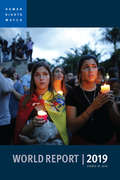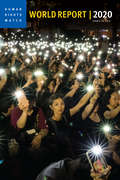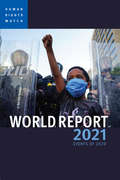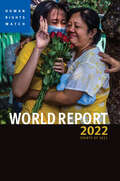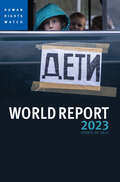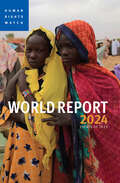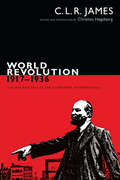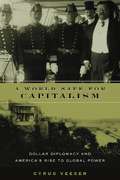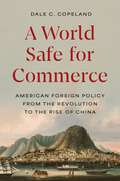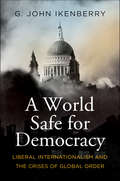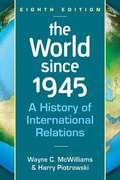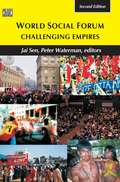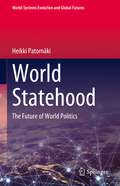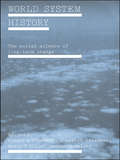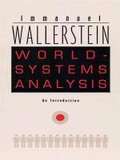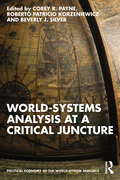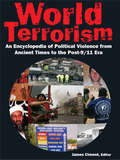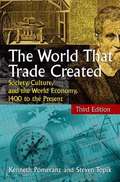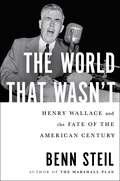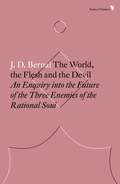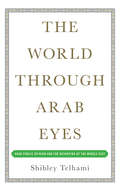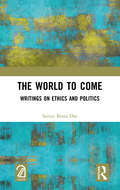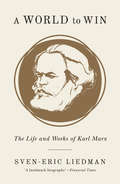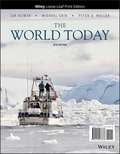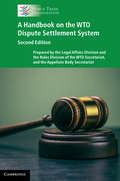- Table View
- List View
World Report 2019: Events of 2018
by Human Rights WatchThe best country-by-country assessment of human rights. The human rights records of more than ninety countries and territories are put into perspective in Human Rights Watch's signature yearly report. Reflecting extensive investigative work undertaken by Human Rights Watch staff, in close partnership with domestic human rights activists, the annual World Report is an invaluable resource for journalists, diplomats, and citizens, and is a must-read for anyone interested in the fight to protect human rights in every corner of the globe.
World Report 2020: Events of 2019
by Human Rights WatchThe best country-by-country assessment of human rights.The human rights records of more than ninety countries and territories are put into perspective in Human Rights Watch's signature yearly report. Reflecting extensive investigative work undertaken by Human Rights Watch staff, in close partnership with domestic human rights activists, the annual World Report is an invaluable resource for journalists, diplomats, and citizens, and is a must-read for anyone interested in the fight to protect human rights in every corner of the globe.
World Report 2021: Events of 2020
by Human Rights WatchThe best country-by-country assessment of human rights.The human rights records of more than ninety countries and territories are put into perspective in Human Rights Watch's signature yearly report. Reflecting extensive investigative work undertaken by Human Rights Watch staff, in close partnership with domestic human rights activists, the annual World Report is an invaluable resource for journalists, diplomats, and citizens, and is a must-read for anyone interested in the fight to protect human rights in every corner of the globe.
World Report 2022: Events of 2021
by Human Rights WatchThe best country-by-country assessment of human rights.The human rights records of more than ninety countries and territories are put into perspective in Human Rights Watch's signature yearly report. Reflecting extensive investigative work undertaken by Human Rights Watch staff, in close partnership with domestic human rights activists, the annual World Report is an invaluable resource for journalists, diplomats, and citizens, and is a must-read for anyone interested in the fight to protect human rights in every corner of the globe.
World Report 2023: Events of 2022
by Human Rights WatchThe best country-by-country assessment of human rights.In this signature yearly report, Human Rights Watch will document and address human rights abuses in more than 100 countries. Executive director Ken Roth&’s lead essay will cover the global contest between democracy and autocracy—with a call for more effective leadership from democracies. Many of the chapters will cover responses to the Covid-19 global pandemic.
World Report 2024: Events of 2023
by Human Rights WatchThe best country-by-country assessment of human rights.In this signature yearly report, Human Rights Watch will document and address human rights abuses in more than 100 countries, plus a keynote essay by executive director Tirana Hassan.
World Revolution, 19171936: The Rise and Fall of the Communist International
by C. L. James Christian HøgsbjergOriginally published in 1937, C. L. R. James's World Revolution is a pioneering Marxist analysis of the history of revolutions during the interwar period and of the fundamental conflict between Trotsky and Stalin. James, who was a leading Trotskyist activist in Britain, outlines Russia's transition from Communist revolution to a Stalinist totalitarian state bureaucracy. He also provides an account of the ideological contestations within the Communist International while examining its influence on the development of the Soviet Union and its changing role in revolutions in Spain, China, Germany, and Central Europe. Published to commemorate the centenary of the Russian Revolution, this definitive edition of World Revolution features a new introduction by Christian Høgsbjerg and includes rare archival material, selected contemporary reviews, and extracts from James's 1939 interview with Trotsky.
A World Safe for Capitalism: Dollar Diplomacy and America's Rise to Global Power (Columbia Studies in Contemporary American History)
by Cyrus VeeserThis award-winning book provides a unique window on how America began to intervene in world affairs. In exploring what might be called the prehistory of Dollar Diplomacy, Cyrus Veeser brings together developments in New York, Washington, Santo Domingo, Brussels, and London. Theodore Roosevelt plays a leading role in the story as do State Department officials, Caribbean rulers, Democratic party leaders, bankers, economists, international lawyers, sugar planters, and European bondholders, among others. The book recounts a little-known incident: the takeover by the Santo Domingo Improvement Company (SDIC) of the foreign debt, national railroad, and national bank of the Dominican Republic. The inevitable conflict between private interest and public policy led President Roosevelt to launch a sweeping new policy that became known as the Roosevelt corollary to the Monroe Doctrine. The corollary gave the U. S. the right to intervene anywhere in Latin American that "wrongdoing or impotence" (in T. R.'s words) threatened "civilized society." The "wrongdoer" in this case was the SDIC. Imposing government control over corporations was launched and became a hallmark of domestic policy. By proposing an economic remedy to a political problem, the book anticipates policies embodied in the Marshall Plan, the International Monetary Fund, and the World Bank.
A World Safe for Commerce: American Foreign Policy from the Revolution to the Rise of China (Princeton Studies in International History and Politics #210)
by Dale C. CopelandAn Economist Biggest Book of the YearHow commerce determines whether America preserves the peace or goes to warWhen the Cold War ended, many believed that expanding trade would usher in an era of peace. Yet today the United States finds itself confronting not just Russia in Europe but China in the Indo-Pacific, Africa, and Latin America. Shedding new light on how trade both reduces and increases the risks of international crisis, A World Safe for Commerce traces how, since the nation&’s founding, the United States has consistently moved from peace to conflict when the commerce needed for national security is under threat.Dale Copeland shows how commerce pushes the United States and its rivals to expand their spheres of influence for access to goods even as they worry about provoking a breakdown in trade relations that could spiral into military conflict. Taking readers from the wars with Britain in 1776 and 1812 to World War II and the Cold War, he describes how America&’s leaders have grappled with this inherent tension, and why they have shifted, sometimes dramatically, from peaceful, mutually beneficial policies to coercion and force in order to increase control over vital trade and prevent economic decline.A World Safe for Commerce reveals how trade competition could lead the United States and China into full-scale confrontation. But it also offers hope that both sides can work to improve their overall trade expectations and foster the confidence needed for long-term peace and stability.
A World Safe for Democracy: Liberal Internationalism and the Crises of Global Order
by G. John IkenberryA sweeping account of the rise and evolution of liberal internationalism in the modern era For two hundred years, the grand project of liberal internationalism has been to build a world order that is open, loosely rules-based, and oriented toward progressive ideas. Today this project is in crisis, threatened from the outside by illiberal challengers and from the inside by nationalist-populist movements. This timely book offers the first full account of liberal internationalism&’s long journey from its nineteenth-century roots to today&’s fractured political moment. Creating an international &“space&” for liberal democracy, preserving rights and protections within and between countries, and balancing conflicting values such as liberty and equality, openness and social solidarity, and sovereignty and interdependence—these are the guiding aims that have propelled liberal internationalism through the upheavals of the past two centuries. G. John Ikenberry argues that in a twenty-first century marked by rising economic and security interdependence, liberal internationalism—reformed and reimagined—remains the most viable project to protect liberal democracy.
The World Since 1945: A History Of International Relations
by Wayne C. McWilliams Harry PiotrowskiNew emphasis on the impacts of globalization, events in the Middle East, and political and economic changes in East Asia - as well as new information and maps throughout - are among the features of this thoroughly revised edition. The text traces the political, economic, and ideological patterns that have evolved in the global arena from the end of World War II to the present, providing the background needed for a solid understanding of contemporary international relations.
World Social Forum
by Peter Waterman Jai Sen"A stellar collection of essays. Indispensable reading."--Immanuel Wallerstein, Fernand Braudel CenterThis comprehensive volume provides a glimpse into the wide-ranging discussions, debates, and arguments that have gone into making the World Social Forum (WSF) one of the more prominent platforms of alternative ideas and practices in the present world. Jai Sen, an independent researcher living in New Delhi, has contributed to a number of works documenting the World Social Forum. Peter Waterman worked for the Institute of Social Studies, The Hague, for nearly thirty years. He is the author of Globalisation, Social Movements, and the New Internationalisms.
World Statehood: The Future of World Politics (World-Systems Evolution and Global Futures)
by Heikki PatomäkiDeveloping a processual understanding of world statehood, this book combines history, political philosophy, explanatory social science, and critical-reflexive futures studies. While doing so, it poses essential questions about world political integration, especially (i) whether and to what degree elements of world statehood exist today, (ii) whether the development of further elements of world statehood in some stronger sense can be seen as a tendential direction of history, and (iii) whether, and under what conditions, a world state could be viable? The book is organised into three parts. The first part, “Cosmopolitical processes”, explores whether world history as a whole is directed towards planetary integration, focusing on the emergence of cosmopolitanism, the world economy, and the peace problematic. The second part of the book, “Reflexive futures and agency”, focuses on the contemporary 21st-century processes of world history in terms of how non-fixed pasts, changing contexts, and anticipations of the future interact. The author explains how certain rational directionality is compatible with the possibility of deglobalisation, disintegrative tendencies, and “gridlock” in global governance in the key areas of the economy, security, and environment. In the final part of the book, “World statehood and beyond”, the author develops further the processual and open-ended account of the formation of interconnected elements of world statehood by discussing the cases of a global greenhouse gas tax and world parliament. He also analyses the feasibility of different paths towards global-scale integration and the potential for conflicts, divisions, and disintegration. This book is a must-read for students and scholars of political science, international relations, history, sociology, political philosophy, and futures studies interested in a better understanding of world statehood, world political integration, as well as the future of world politics.
World System History: The Social Science of Long-Term Change
by Robert A. Denemark Jonathan Friedman Barry K. Gills George ModelskiThis extraordinary book presents a refreshing and innovative overview of the changes to the global system over the last 5000 years. Featuring renowned contributors - each specialists in their field - this is the only volume to offer so co-ordinated a study of continuity and change in the global social, economic and political system. Key areas covered include:* International Political Economy - Robert A. Denemark* Archaeology - Jonathan Freidman* Economic development - Andre Gunder Frank* History - George Modelski* Sociology - Christopher Chase-Dunn
World-Systems Analysis: An Introduction
by Immanuel WallersteinIn World-Systems Analysis, Immanuel Wallerstein provides a concise and accessible introduction to the comprehensive approach that he pioneered thirty years ago to understanding the history and development of the modern world. Since Wallerstein first developed world-systems analysis, it has become a widely utilized methodology within the historical social sciences and a common point of reference in discussions of globalization. Now, for the first time in one volume, Wallerstein offers a succinct summary of world-systems analysis and a clear outline of the modern world-system, describing the structures of knowledge upon which it is based, its mechanisms, and its future.Wallerstein explains the defining characteristics of world-systems analysis: its emphasis on world-systems rather than nation-states, on the need to consider historical processes as they unfold over long periods of time, and on combining within a single analytical framework bodies of knowledge usually viewed as distinct from one another--such as history, political science, economics, and sociology. He describes the world-system as a social reality comprised of interconnected nations, firms, households, classes, and identity groups of all kinds. He identifies and highlights the significance of the key moments in the evolution of the modern world-system: the development of a capitalist world-economy in the sixteenth-century, the beginning of two centuries of liberal centrism in the French Revolution of 1789, and the undermining of that centrism in the global revolts of 1968. Intended for general readers, students, and experienced practitioners alike, this book presents a complete overview of world-systems analysis by its original architect.
World-Systems Analysis at a Critical Juncture (Political Economy of the World-System Annuals)
by Corey R. Payne Roberto Patricio Korzeniewicz Beverly J. SilverAs we enter the third decade of the twenty-first century, the world faces extraordinary system-level challenges—from deep inequality and xenophobic nationalism to militarism and neofascism, from the refugee crisis and environmental degradation to upsurges of social unrest and escalating rivalries among powerful states. This book begins from the premise that world-systems analysis can be a powerful tool for the study of these problems, with the potential to overcome the methodological and theoretical limitations of other social science perspectives. The editors argue, moreover, that world-systems analysis can be strengthened by drawing on its holistic methodologies, returning to its Third World roots, and learning from other critical approaches. The authors in this volume not only make important contributions to comparative and historical social science, they also bring a new vigor to the world-systems perspective. Facing critical junctures in both the "state of knowledge" and the "state of the world," this book demonstrates the continued utility of, and future possibilities for, world-systems analysis.
World Terrorism: An Encyclopedia of Political Violence from Ancient Times to the Post-9/11 Era
by James CimentFirst Published in 2015. This collection holds three volumes. Terrorism is a term that defies easy definition and its meaning has also changed over the course of history. Because this encyclopedia aims at comprehensiveness —across time, geography, and the conceptual landscape —it applies the broadest definition of terrorism: the use of violence or the threat of violence to effect political change through fear, in which the victims of the violence. The encyclopedia is divided into six parts.
The World That Trade Created: Society, Culture and the World Economy, 1400 to the Present
by Steven Topik Kenneth PomeranzIn a series of brief vignettes the authors bring to life international trade and its actors, and also demonstrate that economic activity cannot be divorced from social and cultural contexts. In the process they make clear that the seemingly modern concept of economic globalisation has deep historical roots.
The World That Wasn't: Henry Wallace and the Fate of the American Century
by Benn SteilFrom the acclaimed economist-historian and author of The Marshall Plan comes a dramatic and powerful new perspective on the political career of Henry Wallace—a perspective that will forever change how we view the making of US and Soviet foreign policy at the dawn of the Cold War.Henry Wallace is the most important, and certainly the most fascinating, almost-president in American history. As FDR&’s third-term vice president, and a hero to many progressives, he lost his place on the 1944 Democratic ticket in a wild open convention, as a result of which Harry Truman became president on FDR&’s death. Books, films, and even plays have since portrayed the circumstances surrounding Wallace&’s defeat as corrupt, and the results catastrophic. Filmmaker Oliver Stone, among others, has claimed that Wallace&’s loss ushered in four decades of devastating and unnecessary Cold War. Now, based on striking new finds from Russian, FBI, and other archives, Benn Steil&’s The World That Wasn&’t paints a decidedly less heroic portrait of the man, of the events surrounding his fall, and of the world that might have been under his presidency. Though a brilliant geneticist, Henry Wallace was a self-obsessed political figure, blind to the manipulations of aides—many of whom were Soviet agents and assets. From 1933 to 1949, Wallace undertook a series of remarkable interventions abroad, each aimed at remaking the world order according to his evolving spiritual blueprint. As agriculture secretary, he fell under the spell of Russian mystics, and used the cover of a plant-gathering mission to aid their doomed effort to forge a new theocratic state in Central Asia. As vice president, he toured a Potemkin Siberian continent, guided by undercover Soviet security and intelligence officials who hid labor camps and concealed prisoners. He then wrote a book, together with an American NKGB journalist source, hailing the region&’s renaissance under Bolshevik leadership. In China, the Soviets uncovered his private efforts to coax concessions to Moscow from Chiang Kai-shek, fueling their ambitions to dominate Manchuria. Running for president in 1948, he colluded with Stalin to undermine his government&’s foreign policy, allowing the dictator to edit his most important election speech. It was not until 1950 that he began to acknowledge his misapprehensions regarding the Kremlin&’s aims and conduct. Meticulously researched and deftly written, The World That Wasn&’t is a spellbinding work of political biography and narrative history that will upend how we see the making of the early Cold War.
The World, the Flesh and the Devil: An Enquiry into the Future of the Three Enemies of the Rational Soul
by J. D. BernalA pioneering book proposing a transhumanist vision of the future, from one of the most influential visionary scientists of the twentieth century.
The World Through Arab Eyes: Arab Public Opinion and the Reshaping of the Middle East
by Shibley TelhamiThe uprisings that transformed the Middle East beginning in 2011 have left experts scrambling to understand where the region is likely to go in years to come. But missing from most of the analysis is a longer view of the evolution of Arab Public opinion and identity and how this is likely to influence this fast-changing region. In The World Through Arab Eyes, Shibley Telhami shows how the roots of these rebellions stretch back decades and explains how they will continue to affect the stability of the Middle East in the years to come. Telhami draws on a decade’s worth of polling data and analysis to provide a comprehensive look at this evolution of Arab identity and opinion. The demand for dignity, which was foremost in the chants of millions of Arab demonstrators, went far beyond being a struggle for "food” and individual rights. Telhami identifies the key prisms through which Arabs view issues ranging from democracy and religion to foreign actors, including the United States, European and Asian countries, Iran, Turkey, and, centrally, Israel. These prisms provide a key to interpreting the past, comprehending the seismic changes in Arab politics today, and engaging with the region in the future.
The World to Come: Writings on Ethics and Politics
by Saitya Brata DasAt the heart of the messianic thinking lies an unconditional idea of redemption. The messianic idea of unconditionality is based upon a qualitative distinction between the unredeemed world and the world to come. It is fundamental to this messianic idea that this distinction can't be grasped as transition or mediation. Taking his inspiration from thinkers like Jacques Derrida, Emmanuel Lévinas, Walter Benjamin and Franz Rosenzweig, Saitya Brata Das renews here this task of the unconditional, the task of thinking “the advent of pure future that is always to come", unenclosed in the bounds of law or in the cages of the “worldly”. He thereby draws profound ethico-political implications from such a thought that opens up the infinitude of the future from the heart of our finitude, and shows that such thinking is the very task of our time.
A World to Win: The Life and Thought of Karl Marx
by Sven-Eric Liedman Jeffrey N. SkinnerEpic new biography of Karl Marx for the 200th anniversary of his birthIn this essential new biography—the first to give equal weight to both the work and life of Karl Marx—Sven-Eric Liedman expertly navigates the imposing, complex personality of his subject through the turbulent passages of global history. A World to Win follows Marx through childhood and student days, a difficult and sometimes tragic family life, his far-sighted journalism, and his enduring friendship and intellectual partnership with Friedrich Engels.Building on the work of previous biographers, Liedman employs a commanding knowledge of the nineteenth century to create a definitive portrait of Marx and his vast contribution to the way the world understands itself. He shines a light on Marx’s influences, explains his political and intellectual interventions, and builds on the legacy of his thought. Liedman shows how Marx’s masterpiece, Capital, illuminates the essential logic of a system that drives dizzying wealth, grinding poverty, and awesome technological innovation to this day.Compulsively readable and meticulously researched, A World to Win demonstrates that, two centuries after Marx’s birth, his work remains the bedrock for any true understanding of our political and economic condition.
The World Today: Concepts and Regions in Geography
by Jan Nijman Peter O. Muller Michael ShinIn the 8th edition of this market-leading title, The World Today continues to break new ground in the interpretation and teaching of world regional geography. The text explains the contemporary world’s geographic realms in terms of their natural environments and human dimensions in a clear and concise fashion. The authors look at the ways people have organized their living space, adapted to changing social as well as environmental circumstances, and continue to confront forces largely beyond their control ranging from globalization to climate change. <p> This book offers an approach to Geography that meshes theoretical concepts with regional realities. The evolving regional content of the chapters in the 8th edition of The World Today reflects the dynamic nature of the world’s geography; the changing and growing number of concepts mirror the progress of the discipline; and the ongoing introduction of new digital features reflects the instructional possibilities of new technologies.
World Trade Organization
byDiploma Thesis from the year 2006 in the subject Law - European and International Law, Intellectual Properties, grade: 1,00, University of Salzburg (Volkerrecht), 97 entries in the bibliography, language: English, abstract: Die vorliegende Diplomarbeit behandelt das Problem der Regelung von Wettbewerbsfragen im Volkerrecht im allgemeinen und in der WTO im besonderen. In Kapitel 1 werden die wirtschaftlichen Hintergrunde und unterschiedlichen Motive fur staatliche wettbewerbsrechtliche Regelungen dargestellt. Kapitel 2 stellt verschiedene Tatbestande, die im Wettbewerbsrecht als regelungsbedurftig angesehen werden, vor (z. B. Kartelle, Missbrauch der marktbeherrschenden Stellung, etc. ). Kapitel 3 beschreibt nationale Regelungsansatze des Wettbewerbsrechtes einschlielich bilateraler Kooperationsabkommen, die zur Durchsetzung nationaler Regelungen erforderlich sind. Besonderes Augenmerk wird auch auf die unterschiedlichen Rechtskulturen gelegt, die die nationalen Regelungen beeinflussen. Kapitel 4 stellt die bisherigen Regelungsansatze auf internationaler Ebene dar, wobei die auf regionaler Ebene verbindliches Recht darstellen, die auf universeller Ebene allerdings im Bereich des soft laws bleiben. Kapitel 5 und 6 stellen die Kernkapitel der Arbeit dar und befassen sich mit Wettbewerbsrecht im Rahmen der WTO. In Kapitel 5 werden bestehende wettbewernsrelevante Regelungen in der WTO dargestellt. Zunachst wird beschrieben, welche staatlichen Manahmen, die von der WTO Rechtsordnung erfasst sind, den Wettbewerb beeinflussen. In einem weiteren Schritt wird analysiert, welche WTO Regelungen Staaten verpflichten konnten, privates wettbewerbswidriges Handeln zu regulieren. Da die Regelungen der WTO grundsatzlich Verpflichtungen fur Staaten enthalten, wettbewerbsrelevantes Verhalten aber von Unternehmen gesetzt werden, ist es notwendig, einen Zusammenhang zwischen dem Verhalten von Privaten und den staatlichen Verpflichtungen aus dem WTO Recht darzustellen. In Kapitel 6 wird
